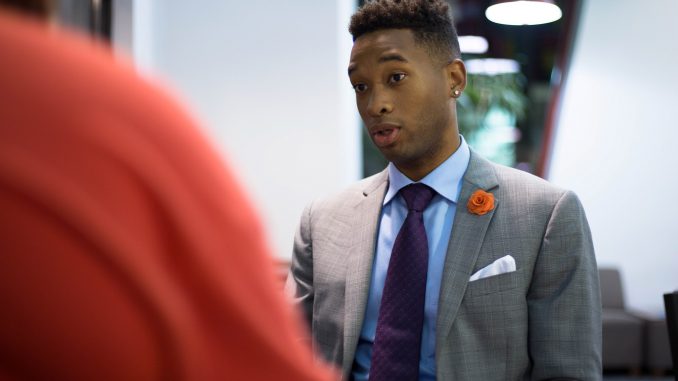
Applications will close Wednesday for Temple Student Government’s first new task force, which focuses on accessibility for students with disabilities around Main Campus. Oct. 14 is the set start date for the task force.
“The Student Accessibility Task Force essentially is a task force composed of students that are dedicated to campus accessibility awareness,” said Jai Singletary, TSG’s vice president of external affairs. “Especially in the midst of all the construction that’s going on around campus, we want each building, pathway and door to be accessible to individuals with disabilities.”
Singletary and Shawn Aleong, TSG’s deputy director of campus life, are the leaders of the task force.
The university has to meet the requirements of the Americans with Disabilities Act, which makes colleges across the U.S. accessible for students with disabilities.
“We don’t want to just meet what’s required, we want to see if we can go above and beyond,” Singletary said. “When we think about the larger scope of enhancing the student experience, we believe we could not ignore [this] and should not ignore [it].”
At first, students who wanted to be a part of the task force had to apply through the TSG website, but the application process was changed so anyone could sign up.
“We don’t want to turn down help,” Singletary said.
Being ADA-compliant and making sure Temple is completely accessible for students with disabilities was one of the central platforms of Empower TU’s campaign.
“[TSG is] starting to carry out the mission that we had set forth on the platform,” Aleong said.
He added that Temple needs improvements, like updated elevators and push buttons for restrooms that will open doors automatically. Several advocates at Temple said the elevators should be larger, stop at each floor and must be more reliable, as some are often out of service. He said these changes would make students with disabilities more independent.
“When we talk about diversity, we also have to talk about accessibility,” Aleong said. “What this task force will do is let students know that even though they have a disability, Temple does care about how they get to class and how they interact with day to day tasks.”
Katherine Gardner, a sophomore communications studies major, signed up to be a part of the task force. She has five different eye diseases and is partially deaf.
Gardner said she joined the task force because she wants to make a difference on Main Campus for those with disabilities.
“I find myself naturally an advocate for people with disabilities,” Gardner said. “I’m comfortable enough to step up and change something and raise awareness.”
She added while Temple is accessible, which is the reason she transferred here last semester, the university still needs some improvement.
“It needs to teach a bit more in the freshmen orientations [about disability awareness],” Gardner said.
Nadira Bostic, an undeclared sophomore in the College of Liberal Arts, who also has a disability, rated the campus an “8 out of 10” in accessibility.
“For the most part it is accessible, but there are some buildings like Ritter Hall that you can’t get into the accessible door without a special ID,” Bostic said. “There are certain spots that aren’t as accessible as they should be.”
She said once the campus is made more accessible, it will attract students with disabilities because “they will know they’ll be able to come here.”
“Being more accessible is a competitive advantage,” said Aaron Spector, Temple’s director of Disability Resources and Services. “I think Temple already has a reputation for being a very accessible campus.”
The Student Accessibility Task Force is planning to work with DRS.
“The work of this task force … can only help us improve that reputation and help with recruitment,” Spector said. “[They] can come to the campus and know that they can be able to participate … and really be a part of campus life.”
Francesca Furey can be reached at francesca.furey@temple.edu.


Be the first to comment